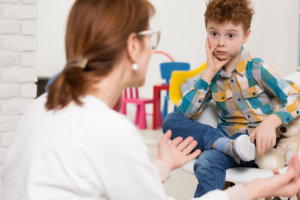Behavior Therapy Reduces Need for Medication in ADHD Kids

Medication treatment and behavior therapy are both considered effective treatments for children with ADHD; the combination of these treatments is generally regarded as an ideal approach for many children. While some professionals question whether behavior therapy is necessary when a child is being effectively treated with medication, many parents have concerns about stimulant medication for their ADHD kids.
A study published in the Journal of Abnormal Child Psychology carefully examined the incremental benefits of behavior therapy to determine whether behavior therapy makes enough of a difference to be worthwhile in the treatment of ADHD in children. In particular, it explored whether combining behavior therapy and medication can reduce the amount of medication required for effective management of symptoms.
This is important for two reasons. First, lower doses might reduce growth suppression, which is associated with sustained stimulant medication treatment in some children. Second, it can also reduce overall side effects and ease family concerns about ADHD stimulant medication.
Question: Could adding behavior therapy to medication treatment actually enable many children to receive significantly reduced doses of ADHD medication?
Forty-eight 5-12-year-old children with ADHD attended an intensive summer treatment program (STP) and were participants in this study. The summer program ran for 9 hours each day and lasted for 9 weeks. Children spent 2 hours each day in academic activities; the remaining time was spent in recreational activities similar to a regular summer day camp.
Study Design
In the study, medication doses were varied (placebo, low, medium, high) and combined with behavioral treatment (none, low-intensity, high-intensity) so that children's behavior in each treatment combination could be assessed. This enabled researchers to determine the impact of different doses of medication combined with different intensities of behavior therapy.
In this study, behavior therapy treatment included:
- a point system to promote desired behavior,
- clearly stated rules and expectations,
- social skills and social problem-solving training,
- social praise and reinforcement,
- athletic skills training,
- and the use of daily and weekly rewards
The conditions varied depending on the child. For example, in the high-intensity condition, children earned and lost points throughout the day based on their behavior and rewards for good behavior were provided on a daily basis. In the low-intensity condition, children received feedback on their behavior but did not gain or lose points, and rewards for good behavior were provided on a weekly basis.
Article continues below...
Treatment for your Child's ADHD
Download a free tip sheet "Recommended Treatment for ADHD: Medication & Behavior Management" for what's really recommended for your child or teen.
Expected Results
As expected, medication treatment in the absence of behavior therapy yielded significant improvements in children's behavior. And, as dose increased, so did the benefits.
Behavior therapy alone also produced significant improvement across a wide range of measures. In general, high-intensity behavior management was more effective than low-intensity behavior management.
Surprising Results
The combination of medication and behavioral treatment led to surprising results.
- On nearly all measures, adding high-intensity behavior therapy to the lowest medication dose led to improvements similar to what would have been expected by high dose medication alone.
- In many situations, even low-intensity behavior therapy combined with low dose medication was as effective as high dose medication.
Results suggested that a typical child with ADHD could be treated with lower doses of stimulant medication if they also received moderate- to high-intensity behavior therapy.
Without behavior therapy, the same child would require four-times the dose to achieve comparable benefits. The addition of behavior therapy allowed for a significant reduction in stimulant medication to achieve similar results.
Why is this Important?
- Appetite suppression effects increase substantially with increasing doses of stimulants. In other words, children were more likely to eat their lunch with lower doses of stimulant medication.
- Adding low- or high-intensity behavior therapy can improve outcomes when a child is also taking stimulant medication.
- Adding medication to either low or high-intensity behavior therapy can improve outcomes.
Summary and Implications
This study suggests that adding behavior therapy to medication treatment can enable many children to receive significantly lower doses of ADHD medication. This could reduce challenges with appetite reduction and growth suppression; it could also be more acceptable for many parents with concerns about ADHD stimulant medication treatment.
It is worth noting that current practice is generally not oriented this way. Typically, when children begin medication treatment the clinician's goal is to find a dose that yields the greatest benefits. They do not typical explore whether similar benefits could be attained if behavior therapy were added to a lower dose.
There are limitations to this study that should be noted:
- Even the 'low-intensity' behavior treatment has multiple components and can be challenging for families to sustain over time.
- The intensive summer treatment program is a very different context from what children typically experience.
- Treatment results were only evaluated over a 9-week period, with the different combinations of medication and behavioral treatment lasting for shorter times. So it is unclear whether these effects are sustainable or can be generalized to other more typical settings.
Still, this study highlights that medication doses can be substantially decreased when combined with well-executed behavior therapy.
In the treatment of ADHD in children, this may be particularly valuable when children are unable to tolerate higher medication doses and where concerns related to appetite reduction and growth suppression are present.
So if you have concerns about the side effects of high doses of stimulant medication for your ADHD child, you may find a better solution by combining treatments of medication and behavior therapy.

